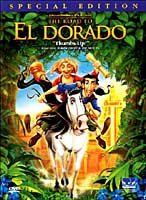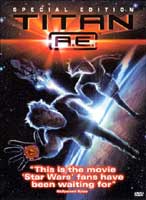by Luis Reyes
|
Debate intensifies about the waning US theatrical animation market and how it functions now that more players are vying for a bigger piece of the animated feature pie. At this year's NATPE, an industry TV licensing convention, animation industry insiders portended doom for the predominantly kids-aimed medium and voiced the need for the industry to reinvent itself.
"It's not the same audience from the '70s and most people are still making it for that audience," explained one major network professional who asked to remain anonymous. "Kids have different tastes now, they listen to Eminem when they're seven. They just don't buy it anymore." In the later half of the 1990s several studios rushed in where only Disney dared to tread, giving The Mouse a run for its money. But this surge in the market left most contenders licking their wounds by 2000, leaving Disney's box office virtually unscathed. Fox has thrown in the towel, rumors fly that Warner Brothers' animated feature division is closing shop, and Dreamworks sits punching the numbers trying to figure out the discrepancy between "The Prince of Egypt" and "Road to El Dorado." All the while, Japan churns out a plethora of high-quality animated features with comparatively low budgets that these American studios have yet to market to its wide demographic. Disney has updated its formula just as the other studios have challenged the Disney model. 1998's "Mulan" featured, for the first time, a female heroine whose primary goal was not to snatch the man of her dreams but rather to be a pro-active agent in a high-stakes plot. "Tarzan," though decked out with almost all the other Disney trimmings, took the songs out of the mouths of its characters and gave them to Phil Collins. And, with the marketing slogan "Nuttier than a holiday fruitcake," "The Emperor's New Groove" has been heralded as the first Disney animated feature targeted sub textually at the gay community. But through it all Disney remains rooted in its wide appeal tactics - flashy, showy, musical with cute little animal companions. Jeffery Katzenberg's actions to rival Disney met with formidable success when Dreamworks produced "Prince of Egypt," its biblical epic about Moses, in 1998. It was the only non-Disney animated feature in recent years to break $100 million at the box office. And, what more, Dreamworks achieved this without heavy merchandising, promotional tie-ins at fast food outlets, nor compromising the religious overtones of its story. "Road to El Dorado" did notably worse, but, stylistically and narratively, took even more risks. "When I heard the concept I thought that it wasn't very exciting, a couple of guys in conquistador times," says Marc Handler, ADR writer for such titles as "Cowboy Bebop" and "Tenchi." "The characters are very charming, the politics of it were good, teaching kids about discovering other cultures�What I heard from people that didn't like it was that there was too much dialogue for an animated show. And there's a lot of patter between the two main characters. I found it very clever dialogue, but I guess that falls to a matter of taste."
Fox's venture into the animated feature market spawned "Anastasia," the critically praised box office flop that put Fox's animation department on hiatus until its space epic "Titan A.E." drove the final nail through its coffin. With "Titan," Fox avoided Disney terrain like a leper, dabbling in a genre that Disney would never touch and aiming at the teenage demographic, a group that Disney traditionally hasn't cared about. But the formula proved disastrous, shot to pieces by the mainstream media. And nearly a week after "Titan's" premiere, Fox announced the closure of its Phoenix-based animation division. Only "The Iron Giant" from Warner Brothers has garnered universal praise as both a family movie and a substantial work of cinematic animation. Based on a 1968 story by British poet-laureate Ted Hughes called "The Iron Man," this film was originally slated to be a musical, a fate away from which novice director Brad Bird and screenwriter Tim McCanlies steered it. Rather stark animation techniques imbued with a Miyazaki tenderness combined with Bird and McCanlies keen sense of storytelling gives "The Iron Giant" the kind of understated appeal that other major studios may have forgot existed. But the box office pulled in a dismal haul of $23 million. According to myriad voices among industry insiders and pundits, it's box office failure had more to do with Warner Brothers' reticence about pouring advertising dollars into this low frills gem. "Princess Mononoke" faced a similar situation when Miramax withheld a pervasive marketing campaign; the Weinstein's tepid about the project's prospects in the harsh animation market. |


